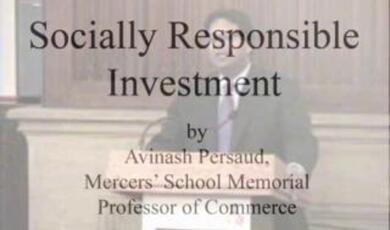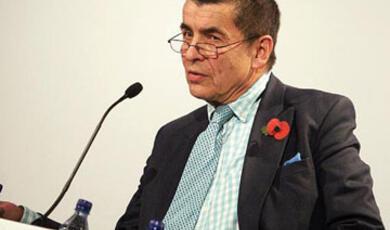Will the US easily relinquish economic and political power to China and India in the 21st century?
Share
- Details
- Transcript
- Audio
- Downloads
- Extra Reading
Avinash Persaud, former Mercers' School Memorial Professor of Commerce at Gresham College.
Next lecture in the series was A simple solution to global imbalance that is easy to implement and is unlikely to make matters worse
Download Transcript
Will the US willingly hand over financial and political power to China and India in the first half of the 21st century?
Avinash Persaud
The issuer of a reserve currency stands in a privileged place. So much so that others often bear resentments and plans of overthrow.
For an issuer of a reserve currency is able to pay for imported things by writing cheques that nobody cashes. Instead others stuff these cheques in their reserves as a store of value, intending only to cash them cheques on some distant rainy day.
This privilege means that the rise and fall of reserve status has important economic and political impact around the world.
The controversial contention of this lecture is that contemporary observers take away the wrong lesson from the history of sterling’s decline as the world’s reserve currency during the last century.
Sterling’s decline was indeed long. The US had become the world’s largest economy, at the latest by around 1880, but by the 1930s, still 60% of central bank reserves around the world were held in sterling. The dollar did not usurp sterling’s position as the currency held in greatest amounts in central bank reserves until 1958; some eighty years after the US economy had become the world’s largest. And until 1968, some ten years later, sterling remained an important reserve currency. Many wonder whether sterling’s journey of decline might have been longer still, were it not for the heavy debts the UK incurred in fighting World War 2.
Most observers attribute this long process to: the power of inertia, the importance of good institutions, and the intial reluctance of the United States to play a global role. The implication is that while the China and perhaps India may overtake the US in economic size by 2035 or so, the shift from the dollar to the yuan or rupee would take a good deal longer and will be more of an issue for our grand children than ourselves.
This assessment by many observers has many elements of truth about it, but it is incomplete in a few important dimensions.
First, the journey of sterling’s decline as a reserve currency was partly held up by the fact that for four decades after being knocked off the perch of world’s top economy, the UK was still the world’s largest creditor. Up to 1915, the UK was running large surpluses on trade in the order of 5% of UK GDP, surpluses, that the City of London then recycled as international loans. Today the US is the world’s largest debtor, not creditor and its international debts are increasing at a pace of 5% of US GDP every year.
The debtor position of the US underscores my main point today, which is that while the dollar may cling on to power for some time; the process of eventual capitulation will be a painful one. Domestic consumption and economic activity will be so constrained by the need to repay dollar loans held by foreigners, as to lead to a build up of social pressures or inflation or both. So painful will this journey be, that the US will not willingly stroll down it, but will continuously look to use its economic, financial, political and military to find a detour, or at best, to delay the journey.
Up to 1968, UK post-war history was inextricably linked to the problem of the unwinding sterling balances. The future of the next thirty odd years will be inextricably linked to the unwinding of the “dollar balances”.
Because of the pain of the process, the UK resisted sterling’s decline through a number of measures, most important of which, were non-market mechanisms: Empire and control.
This is the lesson of sterling’s long decline. Long before the dollar is no longer a reserve currency, its holders may no longer be voluntary. The first half of this century will be about the use of US power, soft and hard power, to slow the arrival of the inevitable loss of the dollar as the world’s reserve currency.
In a previous Gresham Lecture, entitled When Currency Empires Fall, I explained why the dollar will lose its reserve currency status. As that Lecture and all of the other lectures at Gresham can be found on the excellent Gresham website (www.gresham.ac.uk) I don’t want to bore any of you by repeating the arguments in great detail.
Suffice to say the following. Currency empires come and go. Over the last few thousand years there have been around a dozen international currencies used extensively outside the borders of the country issuing them, from the dinari and drachma of ancient Rome and Greece, to the dinar and ducato of the Islamic empire and Venice, through to sterling and now the dollar today.
There tends to be only one dominant reserve currency at any one time. As I have put it before, except at the point of changeover, the spoils of reserve currency status go to the victor alone, they are not evenly shared. This is because international reserve currencies have the attributes of a natural monopoly or in more modern parlance, a network. If it costs extra to trade with some one who uses a different currency than you, it makes sense for you to use the currency that most other people use, this makes that currency yet bigger and cheaper to use. There is a good analogy with a computer operating system. Many people swear by the superiority of Apple’s computer operating system, but Microsoft Windows is the dollar of computer networks and few are prepared to bear the cost of not using Microsoft when those they are trying to communicate with do. In recent years Apple has effectively been forced to go over to the dark side, as the Macintoshes refer to Microsoft.
This networking power is why Central banks store dollars in their reserves in a far greater proportion than the proportion of trade their country conducts with the US. While 30% of international trade is with the US, 70% of central bank reserves are in dollars. It is why most commodities, like oil, copper and coffee are priced in dollars, wherever they are found and whoever they are sold to.
Another reason why there tends to be just one currency, even today when there are a number of liquid currencies to choose from, is that reserves are crisis insurance. A reserve currency must be negatively correlated with your risks in times of crisis: rising in value when other assets are falling. The more dominant a reserve currency is and so the more market participants turn to it in times of crisis, the more its reserve status is entrenched. The South African rand is liquid but it will not become a reserve currency.
A key determinant of whether a stable currency becomes the internationally dominant reserve, is the size of its trade in general and imports in particular. Imports tend to be priced in the currency of the destination country. In the 1880s, around 30% of global trade was with the UK and probably 60% of world trade was financed in sterling. After the war, Her Majesty’s Treasury declared with some superiority in a telegram to the British Embassy in Tamsui that “Sterling has been in the past and will be, we believe in the future, the currency most generally used for trade throughout the Far East and Southeast Asia.
On current trends, by around 2035, China will have the largest economy. Already import demand from China for commodities is driving international commodity markets. By 2035, international trade will be dominated by Chinese imports and exports.
The thought of the yuan replacing the dollar sits a little uncomfortably with present day China where financial and regulatory institutions are immature. But if we were transported back one hundred years to 1906, and I said at a Gresham Lecture that the dollar would one day replace sterling as a reserve currency because of economic size; many a British Treasury upper lip would quiver and retort, that the United States did not have the institutional maturity, the air of stability and the depth of economy to possess the world’s reserve currency. And they would have been right, in 1906, some seven years before the Federal Reserve Board was established and just two decades after a period in which many States defaulted on their civil war debts. But while the dominant at the time always like to think that their dominance is the result of god-given attributes, the reality is more mundane. Institutional maturity and economic depth come with economic growth. China does not have the institutions to become issuers of the world’s reserve currency today, but it would be fool-hardy to doubt that it would not have them by 2030.
Of course there are a number of risks to this view. China’s economic miracle has been State-led, which is unlikely to be appropriate for the next giant leap forward. Transformation from State-led to private-led growth will not be easy. Material affluence will bring demands for political reform and that transformation may not be easy either. China’s financial sector and financial institutions are relatively immature. If the yuan stumbles for any of these reasons or others not yet emerged, the dollar’s decline may be held up, but maybe not materially so. Waiting in the wings for the yuan to stumble is the Indian rupee. India is the world’s largest democracy where recent growth has been led by the private sector. And courtesy of China’s one-child policy, it is India that will end up with the largest population and therefore the potential of being the world’s largest economy.
So the destination is the eventual loss of the dollar as a reserve currency, perhaps to China or India. As has been said before, if the 20th century was America’s century, perhaps the 21st will be Asia’s. But lets talk more about the journey, a journey that starts soon, or may already have started.
Gaining reserve currency status is heaven as you write checks and no one cashes them. Losing reserve currency status is hell as everyone starts to cash all the checks you ever wrote back in time.
In 1949, one of the leading economists of the day, Professor Lionel Robbins of the London School of Economics wrote the following:
“Even if we put our internal finances in order and remove all traces of inflationary pressure from the system, our external account will still be under grave pressure, if the export of capital continues at the level of recent years. To have to make exports, or to borrow abroad, to the tune of GBP300 millions a year or more to make possible new transfers or the repayment of old debt is a burden which we ought not to assume.”
The point Robbins and contemporaries like Andrew Shonefield were making was that in order to earn the significant surplus required to pay back these cheques, the UK was forced to generate offsetting external surpluses and ultimately the only way to do this was by reducing consumption at home to pay foreign creditors. The UK’s economic underperformance with other industrial countries could be explained by this unique requirement to make substantial international transfers to repay debts on investments on bullets, tanks and soldiers that were probably spent and were at any rate not generating an income. (I hope no one would consider it insulting to the UK to say that there is an interesting analogy here with the contemporary debate on international debt forgiveness of poor countries.)
Where other countries were able to meet aspirations through high growth and promising prospects, poor growth focused those in the UK on a fight for shares of a near static economic pie, creating mutual suspicion, restrictive practices and vested interests.
A former Gresham Professor, Kathleen Burk brought to my attention that on 29 April 1975, the Wall Street Journal carried a leading article entitled “Goodbye Great Britain”. This portrayed an image of Britain on the verge of political and economic meltdown such that there was now a toxic mix of exchange rate weakness, a risk of hyperinflation, a collapse of business confidence, confiscatory levels of taxation, loss of control over public expenditure and the twin deficits of the balance of payments and the public finances.
It is not that everything that was wrong with Britain was to do with the sterling balances, Britain had more than its fair share of problem institutions, but it would have been easier to work through them with high growth. By acting as a drag on growth, the sterling balances, put the UK into a pressure cooker. We consider France and Germany as having structural rigidities far greater than our own today, but these economies far outpaced UK growth in the 50s, 60s and 70s and this helped them survive those rigidities - perhaps too well for their own good.
With the wonderful vision of hindsight there may have been more decisive ways of dealing with these capital transfers. But the political cycle did not help. Today we see the rise of incumbency in politics. Mrs Thatcher served for ten years and Mr. Blair may do so as well. But in the post-war period, politicians had good reason to assume they would be turfed out of office long after any solution to the sterling balances bore fruit, and so they often thought the best course of action, was to defer the problem for the next Chancellor to deal with. That is not to say that there were easy solutions just waiting to be employed. Effectively the UK could have repudiated the sterling debts, but this would have led to an instant collapse in sterling as any sterling balance not repudiated was sold. The City for one would have been a loud and influential voice against something that would have destroyed the credibility of sterling. In the end the politicians sought managed decline through an exercise of non-market mechanisms and power.
After the US had replaced the UK as the largest economy, the UK continued to consider that its place in the world was to lead it, even though its ability to do so was declining. But this was being masked. In the 1930s, over 60% of world-wide central bank reserves were held in sterling and around 20% in dollars, roughly similar proportions to the dollar and euro respectively today. But almost 90% of these reserves were held by colonies, or countries under substantial influence of Britain. 50% of the reserves were held by the Indian Sub-continent alone. Today China holds $1trn of reserves and everyone argues this is a waste of resources, but proportionally, China’s holdings of world reserves are lower today than India’s was then. Other large owners of sterling reserves in 1930 were Australia, New Zealand, South Africa and Hong Kong. Two things immediately come to mind. In so far as these countries were colonies with substantial trade with the UK it is understandable that they should keep their reserves in sterling but it was not altogether voluntary. And where were the sterling reserves of the largest economies where the authorities were making voluntary decision such as the United States, France, Germany, China and Japan, held little sterling in reserve.
The reality then is not that there is a long inertia between the fall of one reserve currency and the rise of another, but a quicker process that in the case of sterling was delayed by the influence of Empire.
The problem with masks, is when you forget that you are wearing one yourself. Although the involuntary nature of sterling’s position was evident from the data in the 1930s, British politicians had sold themselves the fiction that the reason why sterling was the world’s reserve currency was the unshaken-able result of its superior institutions and history; and so they went into the process of decolonization without expectation that this would herald the problem of returning sterling balances. When this began to happen there was a certain degree of indignation.
I am reminded of another passage of Lionel Robbins, written in response to one of the frequent crises caused by the reduction in sterling balances by foreign central banks.
“we did not incur the expenses, in respect of which these balances arose, for any narrowly selfish purpose. The money was spent in a common cause and we feel that it is unfair that we alone should bear the burden. There is something repugnant to the most elementary sense of equity that we should be endangering our whole position in the world, to repay monies whose expenditure made possible the victory of Alamein,
While we can have sympathy for these remarks the problem about thinking that right is on your side, is that it tempts you into feeling justified for doing wrong. And so, after repeated attempts at exhortation, the British finally gave in to a version of repudiation. In September 1968, a facility was set up under the auspices of the BIS that would guarantee the dollar value of a part of the sterling balances held by major holders of sterling, in return for an agreement by the holders not to liquidate them in the near future. This is not so bad you might think, and a guarantee is no repudiation, but remember these reserves were not held as part of a long-term investment fund, but were reserves held by countries in case they needed liquidity in an emergency. Locking them up made them useless as an emergency reserve. September 1968 marked the end of sterling as a reserve currency.
Let me conclude with an assessment of the lessons here for the United States and the rest of us.
The consequences of losing reserve currency status are substantial. Funding the return of dollar balances will slow growth leading to social pressures. Macroeconomic attempts to off-set these pressures will turn them into inflation pressures and an unfortunate spiral will develop of reserve diversification, sending the dollar lower, pushing up inflation, causing the Fed to tighten policy, which will depress growth, prompting fiscal policies to stimulate growth, causing inflation, sending the currency lower, etc.
As a result, we should expect attempts to be made to defer the eventual decline of the dollar, as a reserve currency will be sought. This will not always be clear and straight forward. In the UK there was a sizeable body of opinion in the 1950s linked to industry that would have preferred to have repudiated the sterling balances, but the City feared it would destroy their credibility and they would hear none of it. In the US there will be similar pressures probably seen in a split between Congress where industrial interests have strong constituencies and the Executive, which may be more under the influence of Wall Street.
To justify the repudiation of debt, or something of the same effect such as a large devaluation or a cancellation of part of the debt, the US will, like Lionel Robbins before, try and initially gain the moral high ground. In Congress stories which say that the US built up the debt for selfless reasons have much currency, the most popular story, with little parsimony, is that the US deficits are needed to save the world economy from recession.
Assuming that Wall Street has the upper hand initially and Congress is not allowed to fly a Kamikaze plane through the dollar’s standing, with devaluations and punitive tarrifs, we should expect to see continued attempts to bring more countries into a dollar-area. As the end nears the degree to which countries voluntarily hold dollars will fall more quickly than the size of dollar reserves.
Let me present one use of soft power that serves to entrench the dollar’s reserve currency. The US has in recently years, and despite the rhetoric, eschewed multilateral trade deals and sought bilateral trade arrangements or Free Trade Agreements, FTAs.
In recent years and amid the wreckage of Doha there have been around 20 FTAs passed on in the works. The deals promote trade growth and a further entrenchment of the dollar-area. The advantage of FTAs for the US is that they are negotiated by unequal parties and the US is able to use a wide range of pressure and influence on countries to secure a better deal for the US than they would achieve in a multilateral setting, especially in the area of finances. Despite the successful and judicious use of capital controls by Singapore and Chile, two countries that have signed an FTA, and despite the disconnect between capital convertibility and trade flows, the US have insisted that any country signing an FTA with the US can no longer impose capital controls at any time. This has required FTA countries to find alternative ways of reducing exposure to foreign exchange risk such as closer dollar pegs and higher dollar reserves.
Mixed in with soft-power of influence using economic measures is the hard power of military adventures, especially in countries that are not economically aligned with the United States. But the problem with military adventures however is that they can make it clear that the willingness to take on a global role is no longer matched by the same ability.
As my friend John Nugee has put it, American may have began its global role by having the ability, but not much willingness to do so. In the end it may have a willingness to perform a global role, without much ability as the result of some military adventure too far. Then the repudiation school will gain the upper hand. At the end of the day, there will be a new Basle Agreement which stops everyone rushing for the exit at the same time. Countries wanting to avoid being forced to stay in dollars should get out now. Of course, this would provide some temporary fillip to the likes of the euro and sterling while the yuan matures, but that could be the subject of a whole lecture in itself.
Good night and best wishes.
© Avinash Persaud, Gresham College, 5 October 2006
This event was on Thu, 05 Oct 2006
Support Gresham
Gresham College has offered an outstanding education to the public free of charge for over 400 years. Today, Gresham plays an important role in fostering a love of learning and a greater understanding of ourselves and the world around us. Your donation will help to widen our reach and to broaden our audience, allowing more people to benefit from a high-quality education from some of the brightest minds.


 Login
Login






